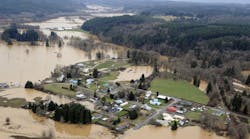Members of Greencastle Borough Council and the Antrim Township Board of Supervisors voted to suspend work and fees to meet MS4 sediment reduction requirements.
Greencastle Borough, Pa., is being told to reduce the sediment it sends to the Chesapeake Bay by 142,000 lb a year, at an estimated cost of $630,000 a year, reported Echo Pilot.
Both municipalities have been calculating fees to fund a sediment reduction project and possible stream bank restoration under their pollution reduction plans.
The township was told to reduce sediment by 245,011 lb per year, with an estimated cost of $2.8 million a year. Township supervisors voted to suspend the MS4 fee that was to go into effect at the beginning of the year.
Although the borough started implementing the fee earlier this year, it recently suspended it pending further reviews of MS4. The fees are just suspended, not rescinded, reported Echo Pilot.
Information provided by state Rep. Paul Schemel indicates the problem may be with how the state’s Department of Environmental Protection (DEP) is enforcing the federal EPA requirements.
The EPA has offered free training to states including implementation and best practices and Pennsylvania is the only state to turn this down, reported Echo Pilot.
“We are attempting to get at the heart of the EPA requirements, and the extent to which DEP may be adding to the cost of MS4 implementation in Pa.,. As you know, DEP is claiming they are requiring the minimum under the federal directives,” said Schemel. ”DEP has repeatedly told us that it is doing the least required. Following this meeting, DEP seems to be incompetent in its MS4 approach.”
“This shows the impact we are collectively having in Harrisburg,” said Greencastle Mayor Ben Thomas Jr. “What I’m hearing is ‘slow down,’ I don’t see why we need to keep pushing until we have legitimate answers.”
Borough council members and township supervisors also planning to meet again in January.
“This isn’t a really well thought out thing,” said Fred Young, chairman of the township supervisors. “This is real money. We’re elected to be fiscally responsible. When constituents ask why we’re doing this, I have no response. If we negotiate with DEP and EPA, we may come up with a project that makes sense.”


